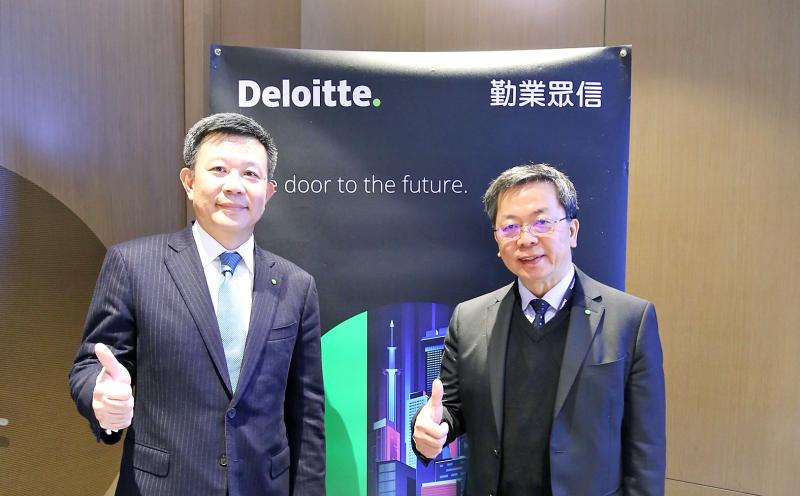The number of initial public offerings (IPO) this year might total 60, with the amount of capital raised likely to reach NT$24 billion (US$842.67 million), as the local bourse gains traction amid an improving global economy, Deloitte Taiwan said yesterday.
The projected number of IPOs would be a more than twofold improvement on last year’s decade low of 29, as the COVID-19 pandemic dampened corporate confidence and pushed back IPO activity, Deloitte Taiwan managing partner Kenny Hong (洪國田) said.
“The number of IPO deals last year could have reached 50 if there had been no virus outbreak and no US-China trade tensions,” Hong told a news conference in Taipei on the development and outlook of the local capital market.

Photo courtesy of Deloitte Taiwan
This year, 31 firms have filed applications, while last year’s 29 firms have raised NT$14.7 billion in funding, a 50 percent decline from 2019, Hong said.
However, this meant that individual firms raised NT$500 million to NT$800 million, better than the three-year average from 2016 to 2018, Hong said.
Monetary easing by major central banks worldwide is favorable for capital markets, including the TAIEX, which was ranked third globally in terms of dividend payouts, Deloitte Taiwan said.
An ongoing rally on the local bourse would support fund-raising activity by elevating price-to-earnings ratios for many firms, TAIEX data indicated.
Share prices in Taiwan Semiconductor Manufacturing Co (台積電), the world’s largest contract chipmaker, surged more than 60 percent last year, while United Microelectronics Corp (聯電), the world’s No. 4 contract chipmaker, more than doubled.
Tech dominated the local IPO market last year, but Pan German Universal Motors Ltd (汎德永業汽車), which distributes BMW, Porsche and Mini vehicles locally, finished first by raising NT$2.3 billion, accounting for 16 percent of the total capital raised, Deloitte Taiwan said.
Proximity sensor maker Sensortek Technology Corp (昇佳電子) emerged a close second with NT$2.14 billion, accounting for 15 percent, it added.
Deloitte Taiwan expects tech firms to be the main participants this year, as Taiwan is home to the world’s major contract electronics suppliers, Hong said, adding that several companies have already filed listing applications and are due to make a debut later this year.
Local companies assign more importance to their environmental, social and governance awareness and showings, in line with an evident global trend, as earning ability can no longer be the sole measure of a good company, Hong said.
US-China trade tensions would continue to shape the global economic landscape and all eyes are focused on how US president-elect Joe Biden would handle the dispute, Deloitte Taiwan chief executive officer Casey Lai (賴冠仲) said.

BYPASSING CHINA TARIFFS: In the first five months of this year, Foxconn sent US$4.4bn of iPhones to the US from India, compared with US$3.7bn in the whole of last year Nearly all the iPhones exported by Foxconn Technology Group (富士康科技集團) from India went to the US between March and last month, customs data showed, far above last year’s average of 50 percent and a clear sign of Apple Inc’s efforts to bypass high US tariffs imposed on China. The numbers, being reported by Reuters for the first time, show that Apple has realigned its India exports to almost exclusively serve the US market, when previously the devices were more widely distributed to nations including the Netherlands and the Czech Republic. During March to last month, Foxconn, known as Hon Hai Precision Industry

Taiwan Semiconductor Manufacturing Co (TSMC, 台積電) and the University of Tokyo (UTokyo) yesterday announced the launch of the TSMC-UTokyo Lab to promote advanced semiconductor research, education and talent development. The lab is TSMC’s first laboratory collaboration with a university outside Taiwan, the company said in a statement. The lab would leverage “the extensive knowledge, experience, and creativity” of both institutions, the company said. It is located in the Asano Section of UTokyo’s Hongo, Tokyo, campus and would be managed by UTokyo faculty, guided by directors from UTokyo and TSMC, the company said. TSMC began working with UTokyo in 2019, resulting in 21 research projects,

Ashton Hall’s morning routine involves dunking his head in iced Saratoga Spring Water. For the company that sells the bottled water — Hall’s brand of choice for drinking, brushing his teeth and submerging himself — that is fantastic news. “We’re so thankful to this incredible fitness influencer called Ashton Hall,” Saratoga owner Primo Brands Corp’s CEO Robbert Rietbroek said on an earnings call after Hall’s morning routine video went viral. “He really helped put our brand on the map.” Primo Brands, which was not affiliated with Hall when he made his video, is among the increasing number of companies benefiting from influencer

Quanta Computer Inc (廣達) chairman Barry Lam (林百里) yesterday expressed a downbeat view about the prospects of humanoid robots, given high manufacturing costs and a lack of target customers. Despite rising demand and high expectations for humanoid robots, high research-and-development costs and uncertain profitability remain major concerns, Lam told reporters following the company’s annual shareholders’ meeting in Taoyuan. “Since it seems a bit unworthy to use such high-cost robots to do household chores, I believe robots designed for specific purposes would be more valuable and present a better business opportunity,” Lam said Instead of investing in humanoid robots, Quanta has opted to invest